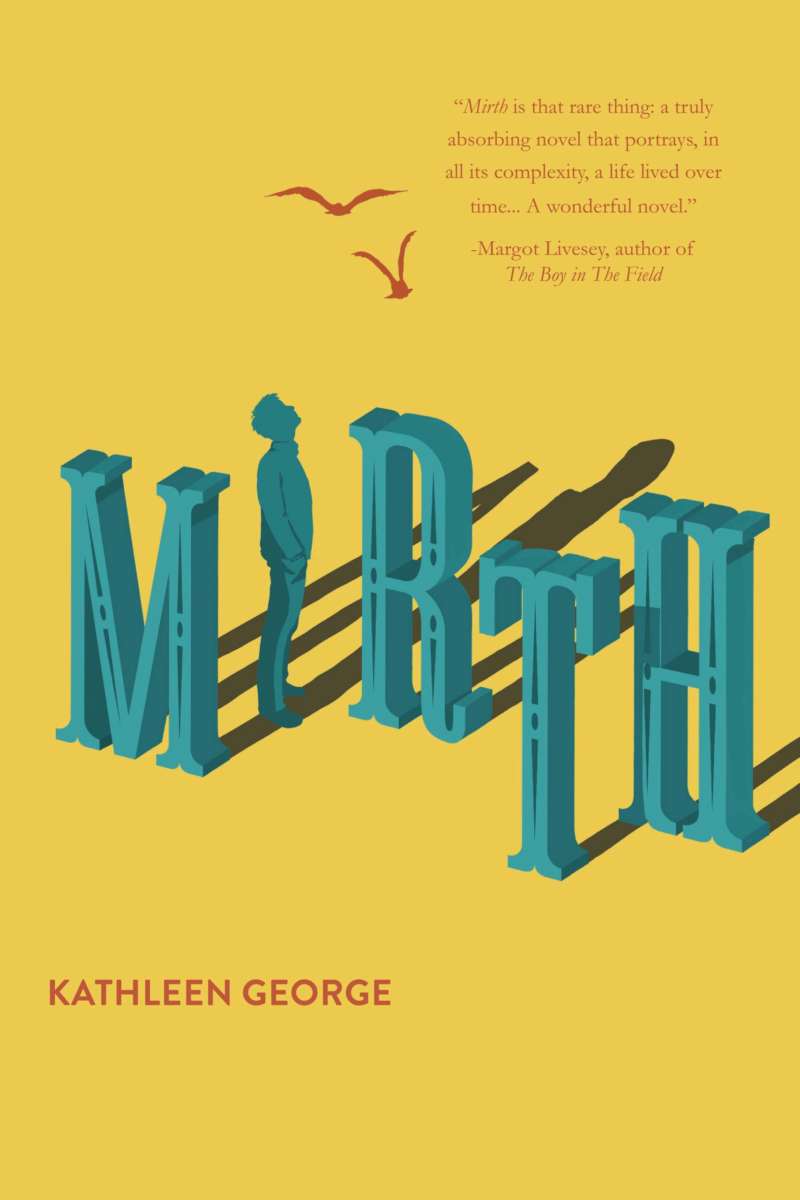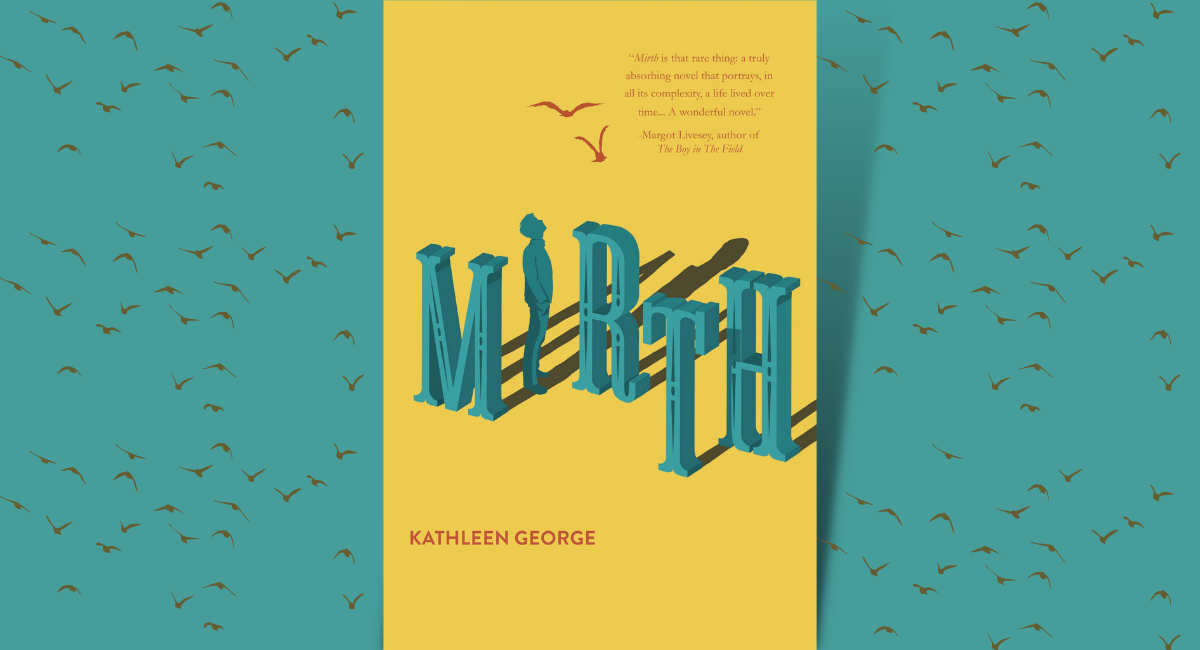Mirth by Kathleen George
A Pittsburgh writer with the inimitable name of Harrison Mirth sits at breakfast: juice, egg, a buttered English muffin spread with marmalade. His third wife, Liz, passes back and forth through the kitchen, attentive to Mirth’s every need. The scene depicts “the beginning of the end,” we are told.
Later that day, the doorbell rings. Liz opens the door — not only on two women from her husband’s childhood but on his entire past: the life he lived replete with hope, disappointment and wonder. Mary Jo and Carol Ann don’t stay long but their visit provokes fresh memories from the old man. Once again, he is young, dapper and fanciful, an aspiring author full of faith in bouquets and valentines, on his way to meet her, The One. Harrison has always been a true romantic.
A NEW KIND OF STORY
In her new novel, Mirth (Regal House Publishing), Kathleen George departs from thrillers and historical fiction to craft an unforgettable portrait of a seemingly ordinary man whose journey through the world is animated by optimism and purpose. Readers will find it difficult to put down this extraordinary story.
Harrison Mirth’s wife, Liz, can’t put it down, either. She gathers every tale from his shabby boyhood in St. Louis, where he was shuffled between indifferent parents and devoted grandparents, through his peripety — defined as a reversal of intention — that led to the couple’s meeting. During the decades between, Harrison had several affairs with women and two marriages, one brief and unhappy and the other long and tortuous. He alternately lurched and glided from one woman to another.
“Would he ever figure out how to have that life? Family life with all its chaos,” George writes of Harrison’s pause between wives Amanda and Maggie. “Eight years later, he would have that life — it was sort of handed to him as if he’d ordered it up, like a sandwich — and it was great and it was not.” There were children, dogs and cocktail parties at the family’s country estate.
Meanwhile, Harrison wrote, rewrote, and received a stream of rejection letters from agents and publishers. At one point, he thinks he might shake his melancholy by running for state assembly. But when Harrison and Maggie spend a weekend in Manhattan, he is elated and she realizes that he will leave, eventually. After living for a few years with one foot in the city and the other in the country, he does just that. He settles in Pittsburgh and starts anew.
A TRUE DEPICTION OF TIME AND PLACE
The author’s gifts include the evocation of place, which is especially evident in Mirth because one of the book’s themes is Harrison’s search for a home of his own. He is not a materialistic man but likes to be surrounded by familiar things — “whatever held memory” — an old shirt, a favorite photograph that hangs on the wall; the way the light falls on the pine floors and the narrow steep stairs in the house he knows like the back of his hand.
After his second divorce, Harrison wonders whether he is fated to be alone. Yet he arrives at the right house in the right city with Liz, the love of his life. The success of his books, which is a long time coming, reflects determination and confidence that has wavered occasionally over the years. In writing as in love, however, he keeps trying until he gets it right.
The novels of John Cheever and John Updike make appearances in Mirth. That sets a postwar mood since Harrison’s story takes off in the mid-fifties, a heady time to land in New York City with the dream of becoming a published author. There is something distinctive about the fiction of those years, of men and women longing for love, confronting new social norms and wrestling with the past. Kathleen George has captured it beautifully, leaving us only wanting to read more.
AN EXCLUSIVE Q&A WITH KATHLEEN GEORGE
Q: Mirth riveted me. Your portrayal of Harrison Mirth is so vivid that I imagine it flowed from your pen in one swoop. When did you start to write the book and what was your inspiration?
A: Wow. A number of people have told me they were riveted which totally thrills me because it’s a quiet story about the inner life, feelings and thoughts. And you’re right about the writing process — it flowed. The only change I made was rearranging a few scenes at the top to emphasize how Lizzie, wife number three, was processing information about her husband’s past life (or lives!). I started writing it in 2016. I had been hard at work on a mystery and I wanted a break. I have been interested for as long as I can remember in a personality that is romantic, positive and forgiving. I wanted to write it.
Q: “Harrison Mirth” is a perfect name for the hero, an optimistic, romantic man with a slightly rueful sense of humor about himself and the world. Could you describe how the name and the title came to you?
A: At first, as I was writing, I titled the manuscript “A Romantic Man.” But I found the word, “mirth,” just fascinating. Could it be a name, I wondered. Could it? I started looking it up and found that, yes, it was a name or part of a name. I made Harrison glad he was not Murth or Myrthwaite which aren’t harmonious sounds. I always care about rhythm and I thought Harrison Mirth was a rhythmic name that reflected the person I wanted to write about.
Q: You write of Harrison: “He was afraid of happiness, trained to replace it with good cheer.” Did he train himself to wear a happy face or was he trained by the women — wives, mother, daughters — in his life?
A: Hm. What a great question. I think he trained himself. I think certain personalities are there at birth and then circumstances shape them the rest of the way. I saw Harrison as a person born gentle and loving and a little thoughtful, sad maybe, but longing for joy and romance. He was neglected and that loneliness made the longing even stronger.
Q: Pittsburgh has been a haunting setting for your novels. How is it a special city to you?
A: I have to say Pittsburgh is a great place. It’s plenty interesting with crazy bridges everywhere, blue collar and white collar workers, a history of steel mills now defunct, multiple colleges and universities, discrete neighborhoods which go way back (“Polish Hill,” for example), houses with tin ceilings and stained glass windows that new owners rehab with great excitement. I have seen so many college students come to the city and decide to stay, to buy houses, to make lives here. There is a lot of texture, a place for almost anyone.
Q: You are the author of thrillers and historical fiction and now Mirth. Do you find that each genre poses particular challenges?
A: Oh, yes. The great thing about thrillers is that plot unfolds more easily. Dramatic questions arise naturally: Who did it, is he going to do it, how can we prove that he did it, how can we solve this crime with zero information, is character x in danger?
I would say historical fiction is the next easiest in terms of driving questions: How can our heroine get past these circumstances? How is this disaster like something in our current time?
Historical literary fiction is maybe the softest in terms of driving questions. The writer has to be so interested in the inner life of a character that the reader will get on board.
Q: Who are some of your favorite characters in American literature and theater?
A: I’m stuck. Immediately, I end up thinking of English literature. My favorite characters have been those with willed optimism, cheer and goodness in the face of trouble. I have fallen in love with these characters: Ross Poldark in Poldark, Christopher Tietjens of Parades’ End, Benedick in Shakespeare’s Much Ado and even the wonderfully hopeless Rooster in Jez Butterworth’s Jerusalem. I know there are American characters I love but they are stubbornly not coming to mind at the moment.
Q: Could you tell us about your next writing project?
A: I seem to be going back to what will be the eighth Richard Christie mystery, the thing I was working on before Mirth. It is a tricky story that challenges me, but I’m snaking my way through it and eager to get back to it. The story has changed on me as I’ve worked. It started as a story of a man killing his wife with cyanide and was inspired by the famous local Ferrante case, though my characters were totally different, made up. But the characters took over and were their own people, and the story is no longer the story I thought I was telling. Again, it looks like it will be about Richard Christie and his paternal nature and the challenges to that part of him as he faces failing health.
Thank you for these questions! They really make me think.
About Kathleen George:
Kathleen George was born in Johnstown Pennsylvania. As a child, she wanted to be a writer. She wrote stories and plays in high school and in her undergraduate years as a creative writing major at the University of Pittsburgh. She went on to earn a Ph.D. in Theatre (also at Pitt). By then she had made her home in Pittsburgh. For eight years she taught theatre at Carlow College, where she directed many plays. Then she accepted a teaching position at Pitt where she continued to direct and teach dramatic literature and playwriting; in the early 80s, she began to add fiction writing back into the mix. In 1988, she earned an M.F.A. degree in Creative Writing (also at Pitt!) on the side. She is a Professor in the Theatre Arts Department.
She is the author of the acclaimed novels Taken, Fallen, Afterimage, The Odds (nominated for an Edgar® award for best novel by the Mystery Writers of America), Hideout, Simple and A Measure of Blood. All seven of these titles are part of her procedural thrillers set in Pittsburgh. In 2014, the University of Pittsburgh Press released The Johnstown Girls, her non-series novel about the Johnstown Flood and in 2018, The Blues Walked In, a novel about Lena Horne and jazz. Kathy is the editor of Pittsburgh Noir, a collection of short fiction, the author of her own short story collection The Man in the Buick and of scholarly theatrical books and articles.
George has been granted fellowships at artists’ colonies, including the VCCA and MacDowell. Her short fiction has appeared in journals and magazines which include Mademoiselle, Cimarron Review, North American Review, New Letters and Alaska Quarterly Review. She has been nominated for a Pushcart Prize and one story was listed among the Distinguished in Best American Short Stories.
Her theatre publications are Rhythm in Drama (University of Pittsburgh Press, 1980), Playwriting: The First Workshop (Allworth Press, 2008, though first in print with Butterworth (Focal Press), 1994) and Winter’s Tales: Reflections on the Novelistic Stage (University of Delaware, 2005).
She has taught for Pitt in London and has served as faculty and as Academic Dean for Semester at Sea. She has directed for Pitt’s mainstage and for the Three Rivers Shakespeare Festival productions which include The Rehearsal, The Country Wife, She Stoops to Conquer, The Winter’s Tale, Hamlet, Much Ado About Nothing, King Lear, A Flea in Her Ear and Our Town. A number of these productions were listed among the Pittsburgh Post-Gazette’s Ten Best of the Year. She has also produced and sometimes directed over sixty original plays written by her students.
She was married to the late Hilary Masters.





